
Share
Empowering Mothers, Transforming Learning: Pratham’s Journey in Scaling at-Home Learning with NIPUN Maharashtra
By Abhinav Sonone, Amola Mehta and Lekha Rao
Apr 14, 2025
Pratham Education Foundation, founded in 1995, is a leading non-governmental organisation focused on improving the quality of education in India. Their approach centres on enhancing educational outcomes through the involvement of government, educators, and communities, and empowering parents. In 2022, Pratham launched the ‘Pahile Paul’ (translates to “first steps”) school readiness programme with the Government of Maharashtra. The programme advances their mission by prioritising the role of mothers in their child’s education journey in the early years. Through the use of WhatsApp groups, the programme shares weekly ‘Idea Videos’ which contain age-appropriate, play-based activities designed for learning at home. Pratham is one of the partners on the LiftEd EdTech Accelerator portfolio, which is supported by the Michael and Susan Dell Foundation, Reliance Foundation, and UBS Optimus Foundation as Founding Partners, the British Asian Trust as the Programme Leader and Central Square Foundation (CSF) as the Design and Technical Partner. The LiftEd EdTech Accelerator aims to significantly shape the future of tech-based learning at home for foundational literacy and numeracy (FLN) in India. This blog traces Pratham’s journey of making educational content accessible by developing a WhatsApp platform capable of automating content distribution and tracking insights on user engagement. This partnership has enabled Pratham to adopt a technology-led approach to improve the efficacy of their programme in Maharashtra.
Pratham’s Home-learning Model
To promote the holistic development of children between the ages of 3 to 6, Pratham’s Early Childhood Intervention combines age-appropriate materials and community resources, with parent and caregiver involvement. Before the COVID-19 pandemic, Pratham’s early childhood program included play-based interventions with children in free and government-subsidised daycares such as Anganwadis, and direct involvement of mothers through community-based interventions and activities. With the onset of the pandemic in 2020, it became crucial to encourage mothers to take an active role in their child’s education. Hence, Pratham transitioned to a home-based and community-centric remote learning approach to ensure continuity in children’s development and learning. As the new home-learning model expanded, Pratham established mother-led learning groups in 14 states, assisting parents in taking an active role in their children’s education. Through this model, mothers who lived in the same neighbourhood and whose children attended the same school would come together once a week to watch Pratham’s play-based learning content and do associated activities with their children at home. These groups became spaces where mothers could share their experiences, receive support, and learn from each other.
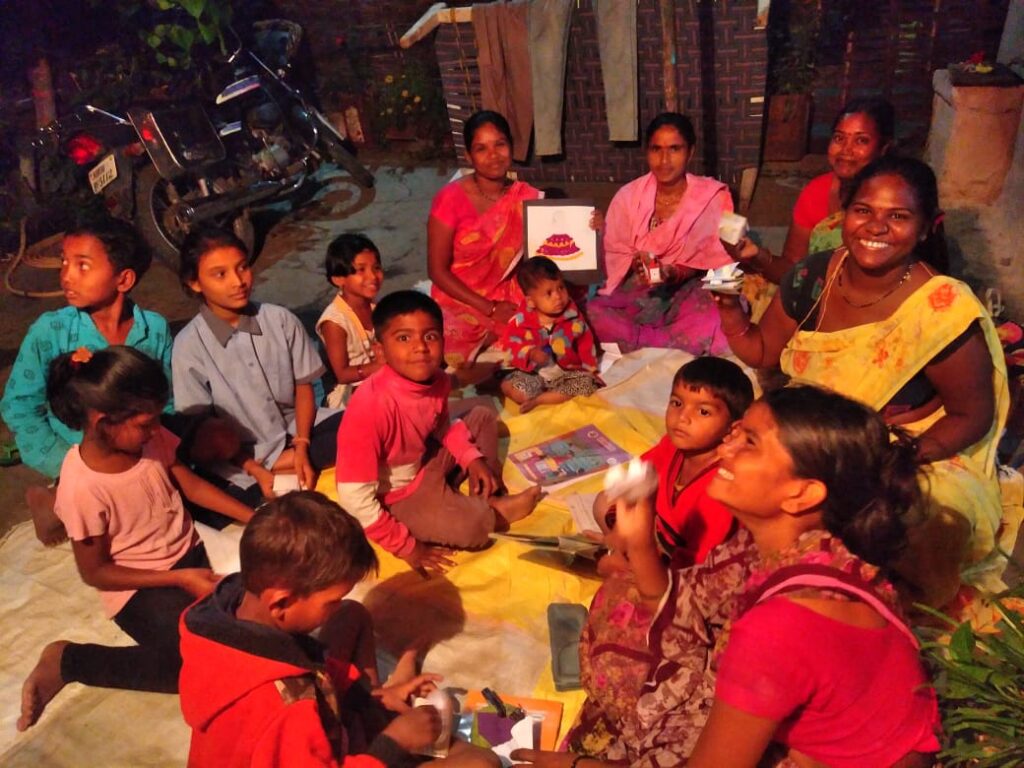
Pratham’s Integration into the NIPUN Maharashtra Programme
In 2022, the NIPUN Maharashtra programme was launched by the Government of Maharashtra, in collaboration with Pratham, to address the need for a systematic and expandable programme to improve basic reading and numeracy. The programme aims to ensure that every child in the state achieves FLN skills by Grade 3. By providing parents with the skills and information they need to support their children’s learning at home, Pratham’s early childhood interventions and mother-led learning models were integrated into the NIPUN Maharashtra programme.
Under the aegis of the NIPUN Maharashtra programme, Pratham disseminates weekly ‘Idea Videos’ which contain easy activities for parents and children. These are aimed at enabling parents and children to come together to enhance children’s basic literacy and numeracy abilities while motivating parents to support their children.
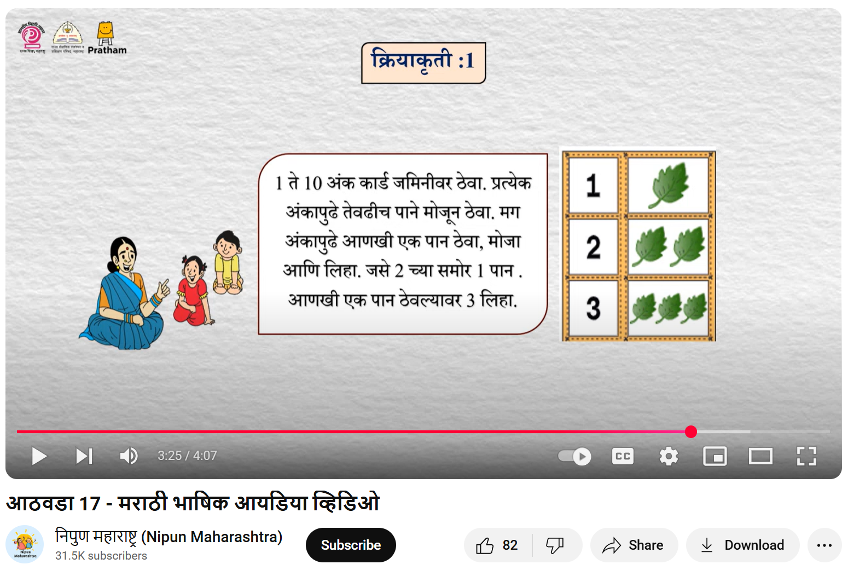
These ‘Idea Videos’ are shared via a cascade of WhatsApp groups, with content moving down from state-level groups to district, block, cluster, and school-level groups. Within the mother groups, mothers with smartphones are identified as ‘Leader Mothers’ and are encouraged to share forward ‘Idea Videos’ they receive on cluster-level WhatsApp groups to their school-level WhatsApp groups. They are also expected to facilitate weekly in-person mother-group meetings and ensure that their group engages with their respective children at home with the associated learning activities.
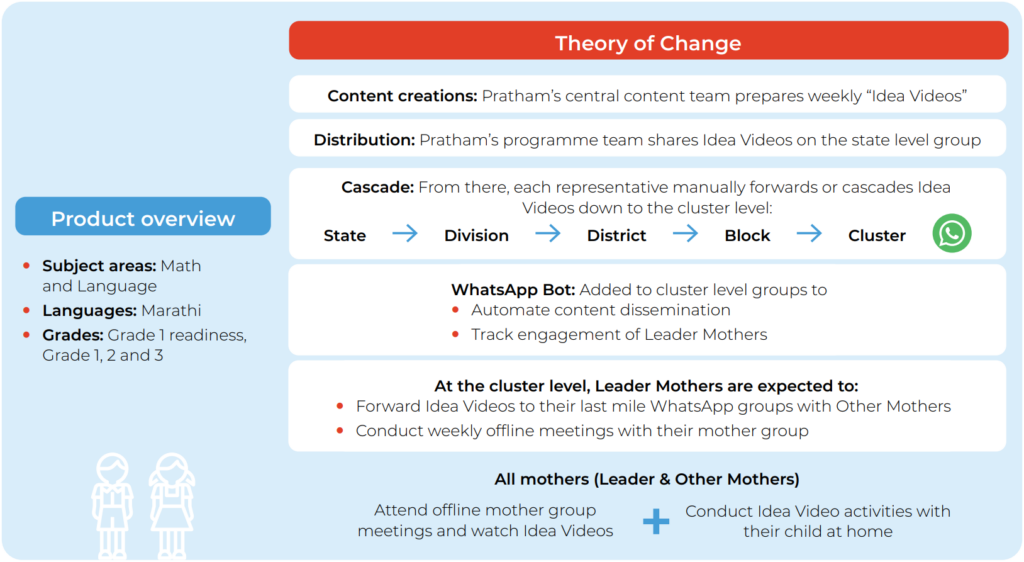
While this state-wide initiative was able to bring together the critical stakeholders needed to address the foundational learning of children, it also encountered challenges along the way:
- High dependence on the WhatsApp cascade: Due to the cascading structure of content dissemination, it was difficult to monitor whether ‘Idea Videos’ had reached all of its intended users, i.e. mothers present on the school-level WhatsApp groups
- Limited visibility & engagement monitoring tools: Pratham’s team was present on WhatsApp groups only till the cluster-level, and had no mechanism to measure the engagement of mothers on school-level groups
These presented challenges in tracking the engagement of mothers and drawing meaningful insights on the progress and effectiveness of the programme. To address this gap in feedback, Pratham integrated a two-way WhatsApp bot into their programme in Maharashtra, through the support of the LiftEd EdTech Accelerator. The WhatsApp bot aimed to automate the dissemination of ‘Idea Videos’ to ensure the seamless delivery of content and simultaneously track detailed user-level data to monitor engagement. By leveraging technology, Pratham was able to ensure that ‘Idea Videos’ reached all Leader Mothers without relying solely on the manual cascade approach. Furthermore, the WhatsApp bot facilitated real-time tracking of participation, providing valuable insights into how mothers interacted with the content and engaged in educational activities with their children.
Pratham’s Journey on the LiftEd EdTech Accelerator
In the first year of the Accelerator (2023-24), Pratham built out and tested the feasibility of the WhatsApp bot. They focused on stabilising the technical capabilities of the bot, as well as its capacity to monitor multiple WhatsApp groups. By the end of the first year, basic engagement tracking features were established, and about 24% of targeted cluster-level WhatsApp groups had been successfully onboarded. These first initiatives paved the way for a more systematic, data-driven approach to Pratham’s early childhood interventions. However, despite these early successes, lower than anticipated engagement was observed on the cluster-level WhatsApp groups, with less than 4% of mothers engaging on the groups on a regular basis.
This prompted Pratham to understand and explore where their programme’s theory-of-change could be strengthened. Their initial findings showed that familiarity and social structures were important factors in WhatsApp group participation. The bot revealed that cluster-level groups were rarely used to discuss learning and education, and a majority of conversations were of administrative or non-relevant nature.
Hence, in the second year of the Accelerator, Pratham conducted a series of experiments which were guided by the hypothesis that engagement and responsiveness of mothers could be improved by a) reaching them on school-level WhatsApp groups, and b) through certain engagement strategies aimed at encouraging their participation. These were the primary aims of the experimentation and would enable Pratham to gauge the level at which mothers could be reached most effectively, and “what works” in terms of engaging them to participate in the learning journey of their children. In addition, they also sought to understand the effects of virtual-only support, as opposed to a hybrid mix of virtual and in-person interactions. To test this, they established three types of focus groups to examine variations in the quality of engagement, with one group at the cluster-level and the other two at the school-level. All three types of focus groups were provided weekly ‘Idea Videos’ and digital nudges, however, one of the two school-level groups would also receive in-person visits from the Pratham field staff. This hybrid-experimentation approach can be understood through the following:
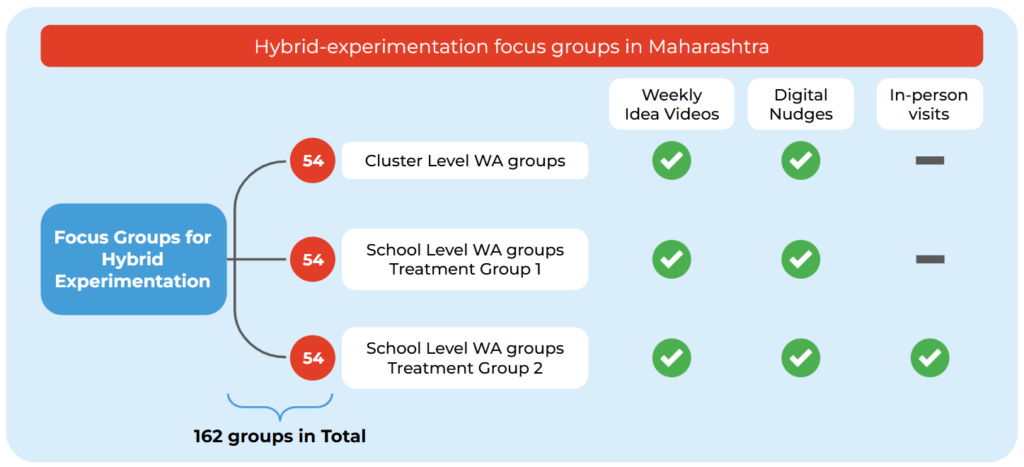
These experiments yielded key insights about the impact of the nature of WhatsApp groups, as well as engagement strategies that were effective in triggering the participation of mothers:
- The school-level WhatsApp groups saw significantly higher activation rates, which was 4.6x to 6.4x than cluster-level groups, emphasising the “pull” of local, close-knit networks.
- The hybrid approach—combining digital nudges with in-person visits (Treatment Group 2) consistently outperformed the online-only model (Treatment Group 1), demonstrating that personalised and human interaction resulted in greater engagement.
- Leader Mothers were also able to sustain engagement in hybrid groups, as they echoed the interactions of the Pratham staff conducting in-person visits.
Digital nudges such as one-on-one phone calls, polls, and messages of appreciation were also effective in engaging mothers in the school-level WhatsApp groups. Surveys conducted by Pratham field staff further revealed that access to smartphones, nature of employment, and education levels had an impact on the participation of mothers, informing Pratham to leverage a human-centred and responsive approach. These learnings were a result of rapid experimentation and collaborative discussions with the portfolio partners of the LiftEd EdTech Accelerator. These partnerships have supported Pratham to iterate and improve their engagement tactics and content distribution strategy in Maharashtra.
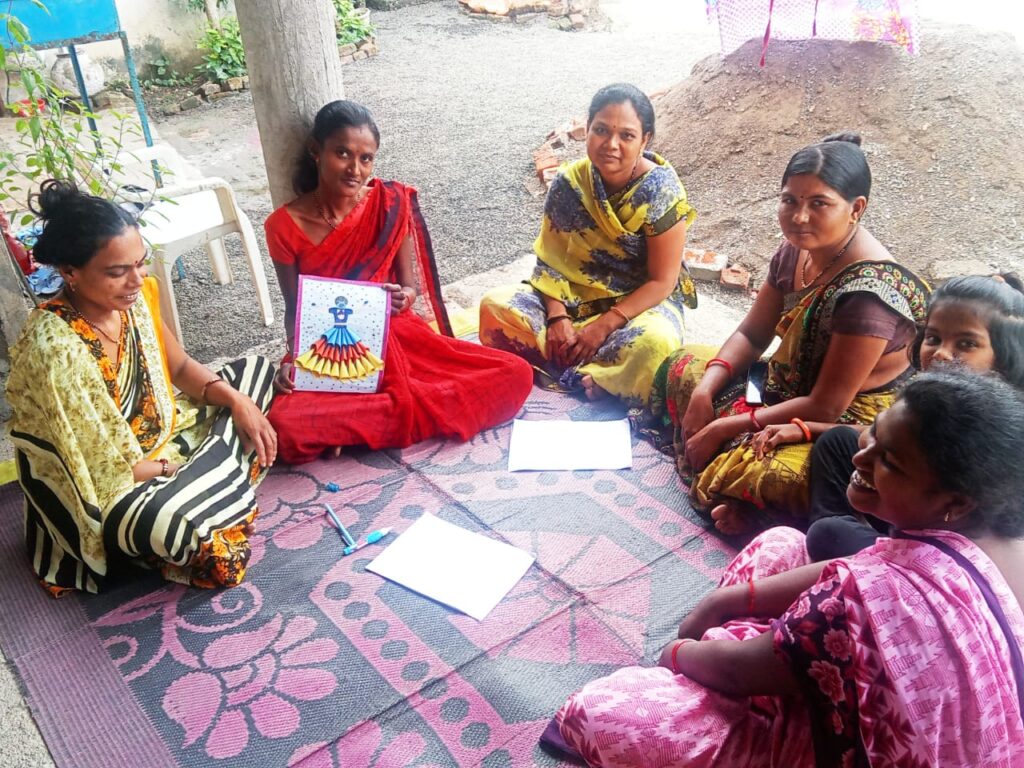
Looking Ahead: What’s next for Pratham?
By creating interactive and adaptive content, Pratham hopes to improve its home-based, mother-centric digital learning model and provide mothers and children with individualised learning experiences. Along with expanding the digital distribution programmes in additional states, Pratham hopes to enhance automated prompts and responses and explore the collection of real-time feedback to continuously improve the engagement of mothers, and the Pratham learning content. Through the LiftEd EdTech Accelerator partnership, Pratham has been able to access strategic support and mentorship to strengthen their impact in Maharashtra and undertake experimentation to generate critical learnings for themselves, and the FLN ecosystem.
——————————————–
Keywords
Authored by

Abhinav Sonone

Amola Mehta

Lekha Rao
Share this on


